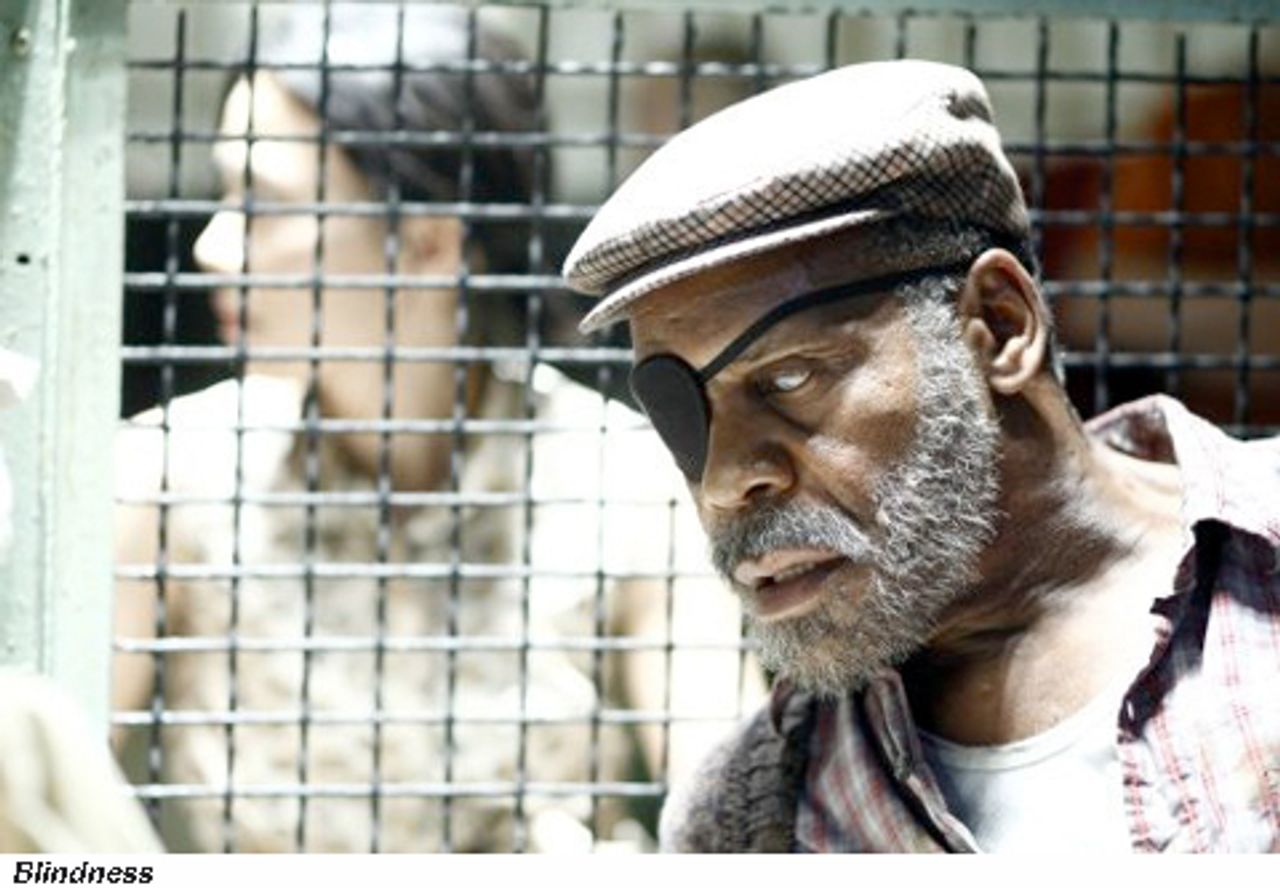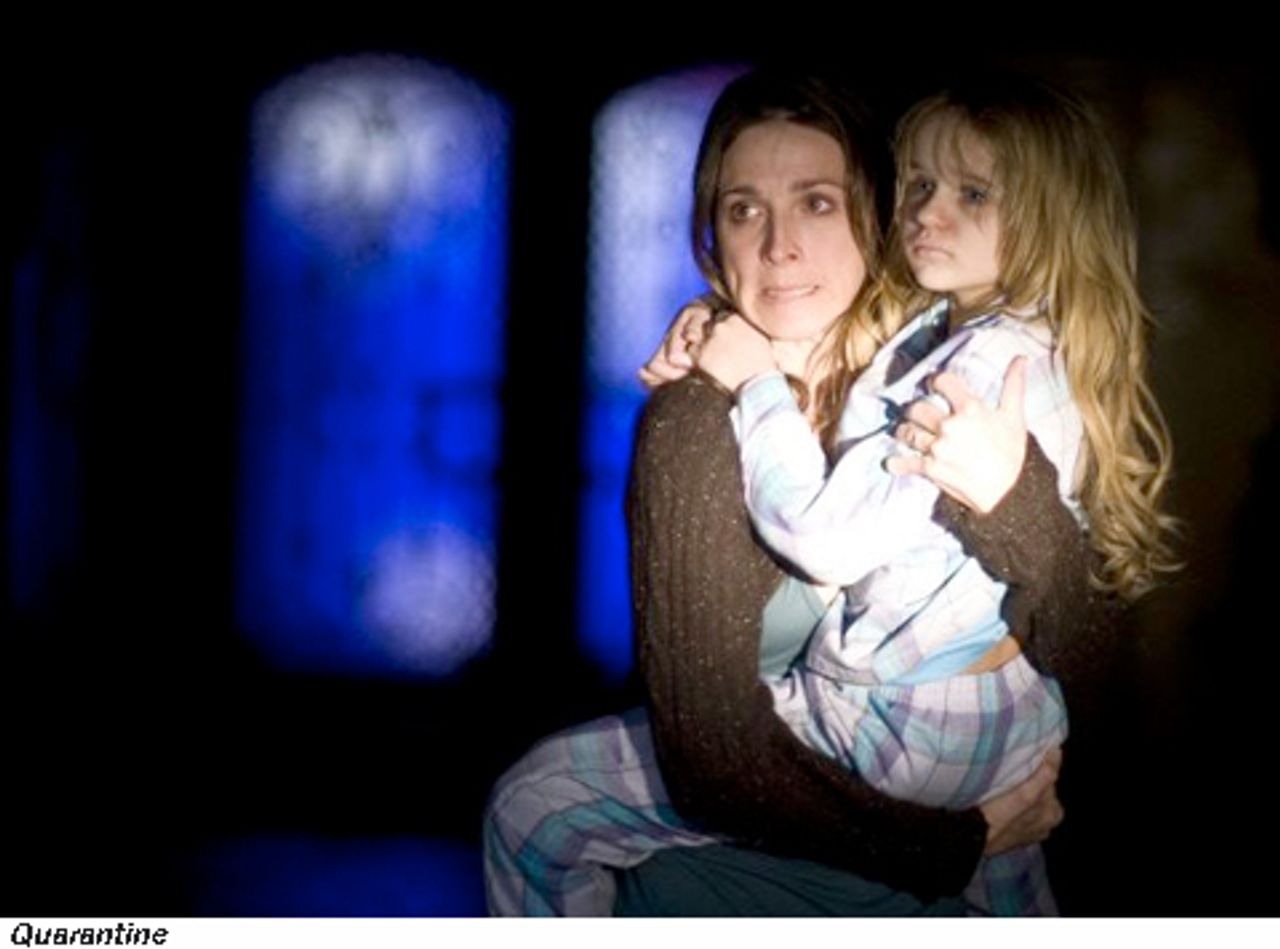Blindness, directed by Fernando Meirelles, screenplay by Don McKellar, based on a book by José Saramago. Quarantine, directed by John Erick Dowdle, screenplay by Dowdle and Drew Dowdle.
Blindness
Blindness, the latest film from Brazilian director Fernando Meirelles (City of God, The Constant Gardener), is an adaptation of Ensaio sobre a Cegueira, the dystopian novel by Nobel Prize-winning Portuguese author José Saramago.
 In book and film, the world faces an epidemic of blindness. The first to suffer from the mysterious infection robbing the world of its sight are placed in a mandatory quarantine in a decaying asylum. Among them are an ophthalmologist (Mark Ruffalo) and his wife (Julianne Moore). The doctor's wife is, inexplicably, immune to the infection and never loses her sight. She chooses to enter the facility, however, to stay with her husband. Keeping her ability to see from guards and fellow inmates, Moore's character becomes the leader of those living in the facility's Ward One.
In book and film, the world faces an epidemic of blindness. The first to suffer from the mysterious infection robbing the world of its sight are placed in a mandatory quarantine in a decaying asylum. Among them are an ophthalmologist (Mark Ruffalo) and his wife (Julianne Moore). The doctor's wife is, inexplicably, immune to the infection and never loses her sight. She chooses to enter the facility, however, to stay with her husband. Keeping her ability to see from guards and fellow inmates, Moore's character becomes the leader of those living in the facility's Ward One.
As conditions worsen over time and food becomes scarce, tensions between the different wards of the asylum increase. No longer satisfied with the meager rationing of supplies, a man in Ward Three (Gael Garcia Bernal) declares himself King. With the help of the men of Ward Three, he takes over food supplies and demands payment for their distribution to others. The remaining inmates in the facility must choose whether to submit to his demands or fight to overthrow their new King.
Certain things are finding a reflection in Meirelles's work, albeit in a limited fashion. The conditions under which the patient-prisoners live immediately bring to mind the images of Abu-Ghraib or the hideous reports of life in Guantánamo Bay. They are subhuman conditions, filthy, crowded. Patients roam the hallways, completely nude, dragging their hands along the walls to orient themselves.
But the work, above all, is an allegory about "human nature." It is a work about what human beings—presumably any and all of them—can be reduced to under trying circumstances. Cruelty, exploitation, and criminality come as second nature to many in the film. Willful ignorance and cowardly obedience from the rest make it all possible. Certainly anything that could be called "society" or "civilization" disintegrates rapidly in the world of the film, both inside and outside the quarantine. The best one can hope for is to retain one's personal dignity. A few manage it; most do not.
Blindness, while allowing a small "family" of characters under Moore's leadership to retain a certain level of decency and hope, nevertheless presents a very bleak and demoralized view of humanity.
The film, like the book, does its best to strip the story's setting and characters of any context. The city and time in which it takes places remain unknown, and most characters go without names. This is yet another "universal" drama treating human nature in the most abstract of ways. Such broad swipes at humanity—in which everyone is "blinded" and blamed—are of little use to anyone.
Meirelles has described his work as "a fantasy outside of space, outside the world." This, one can't help but point out, is the problem.
Quarantine
Quarantine stars Jennifer Carpenter (The Exorcism of Emily Rose, Dexter) as an enthusiastic young television reporter who, along with her cameraman, is assigned to spend the night at a firehouse documenting the activities of firefighters and riding along with them on calls.
 An uneventful evening takes a sudden turn when the firefighters are called to a run-down apartment building to come to the aid of an elderly woman from whose apartment neighbors have reported hearing screams. They find the woman covered in blood, lashing out wildly. In a state of heightened rage, she attacks one of the first responders. When the remaining rescuers attempt to get their colleague out of the building for medical treatment, they find they are locked inside. A mandatory quarantine has been imposed. Armed military personnel will not allow them to leave.
An uneventful evening takes a sudden turn when the firefighters are called to a run-down apartment building to come to the aid of an elderly woman from whose apartment neighbors have reported hearing screams. They find the woman covered in blood, lashing out wildly. In a state of heightened rage, she attacks one of the first responders. When the remaining rescuers attempt to get their colleague out of the building for medical treatment, they find they are locked inside. A mandatory quarantine has been imposed. Armed military personnel will not allow them to leave.
Certain moments in Quarantine are effective. Quarantine victims attempt to argue with those outside only to be faced with the glaring spotlights of military helicopters and the trained guns of snipers. Law enforcement officials inform the news media that everyone has been evacuated from the building while we, the viewers, know the truth. The film does disturb in its best moments. However, these are too few.
Quarantine suffers from a lack of seriousness in its approach and—often quite literally—a lack of focus. The film was shot using a single hand-held camera. Everything in the film is viewed from this camera, which, for the purposes of the narrative, represents the point of view and the footage shot by the news team's cameraman. In an attempt to give the work the flavor of real life, to make the film seem like raw, unedited footage from the scene of some disaster, the hand-held camera shakes and wobbles, rises and falls in constant arbitrary movements. The gimmick is so severe that things often become incoherent. It only leads one to ask how a news cameraman, unable to sustain a steady shot for more than a few seconds, has ever been able to hold a job in broadcasting.
Jennifer Carpenter, in the lead role, is a likeable performer, particularly in the film's first "uneventful" section. After that, she is asked to maintain a level of hysteria—screaming, crying, falling apart—which is held at such an extreme for so very long that one simply becomes numb to it.
As is often the cases with films of this type, the explanation of the sickness in Quarantine and the means by which it is discovered are unsatisfying. Faced with promising material, the work instead finds itself treading through the same tired territory of the least-interesting horror films of recent years.
